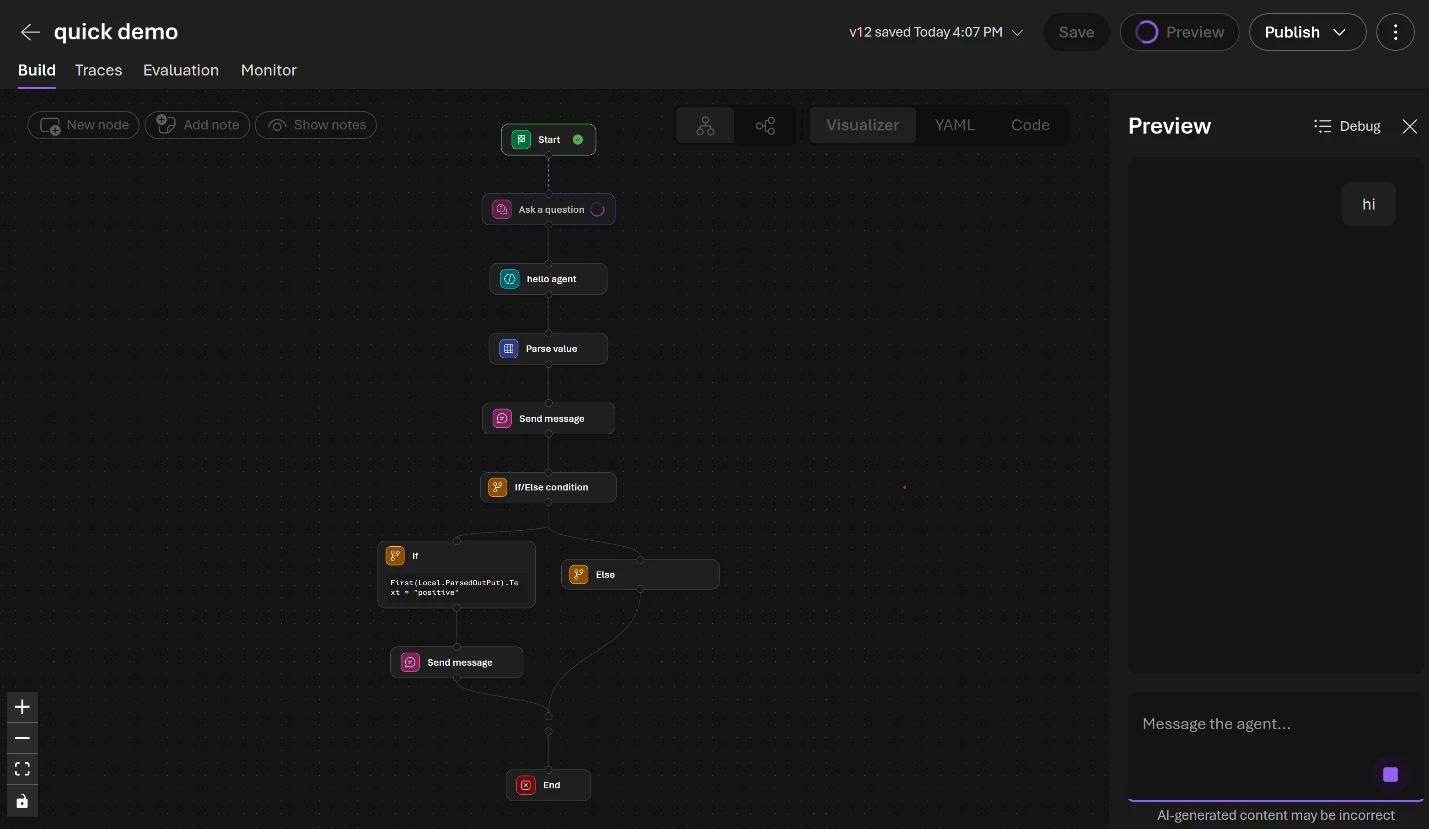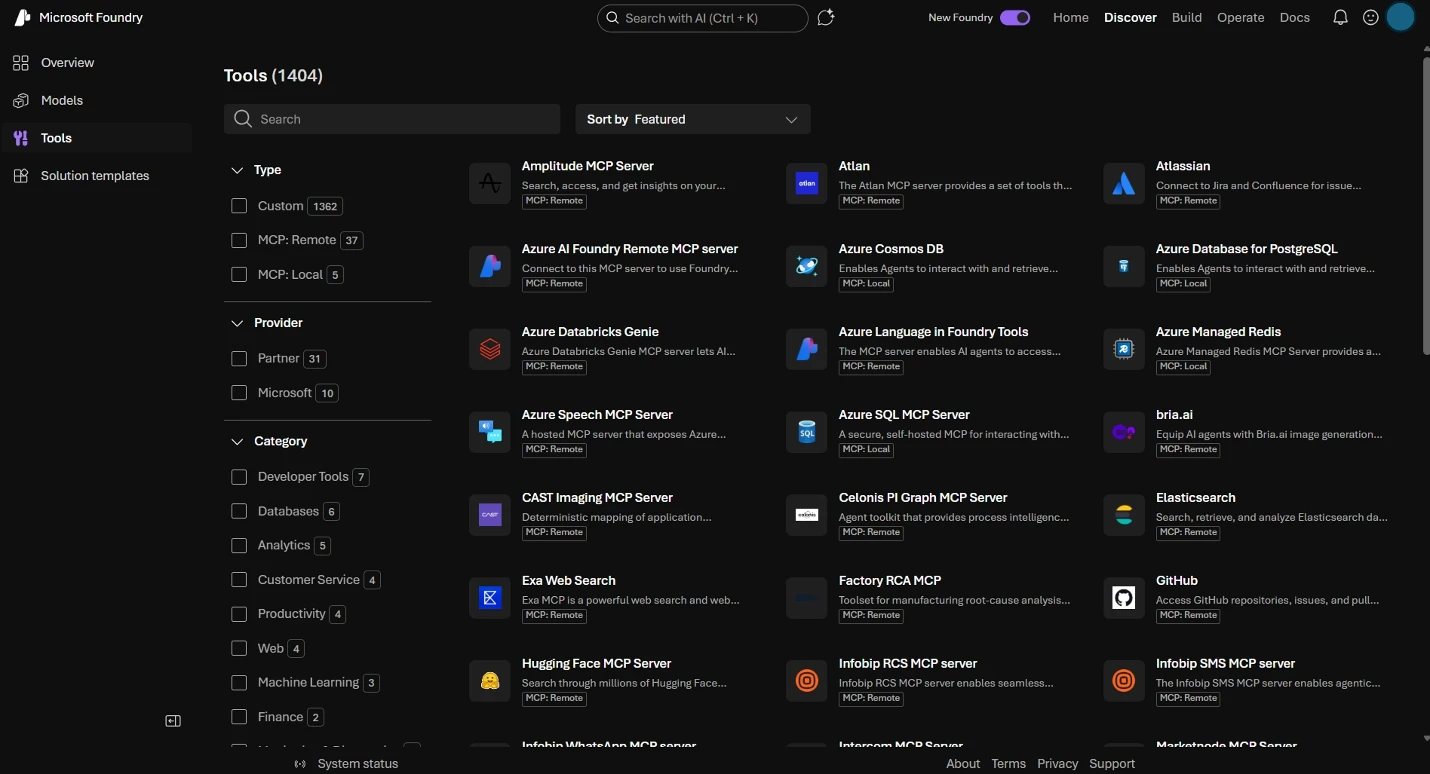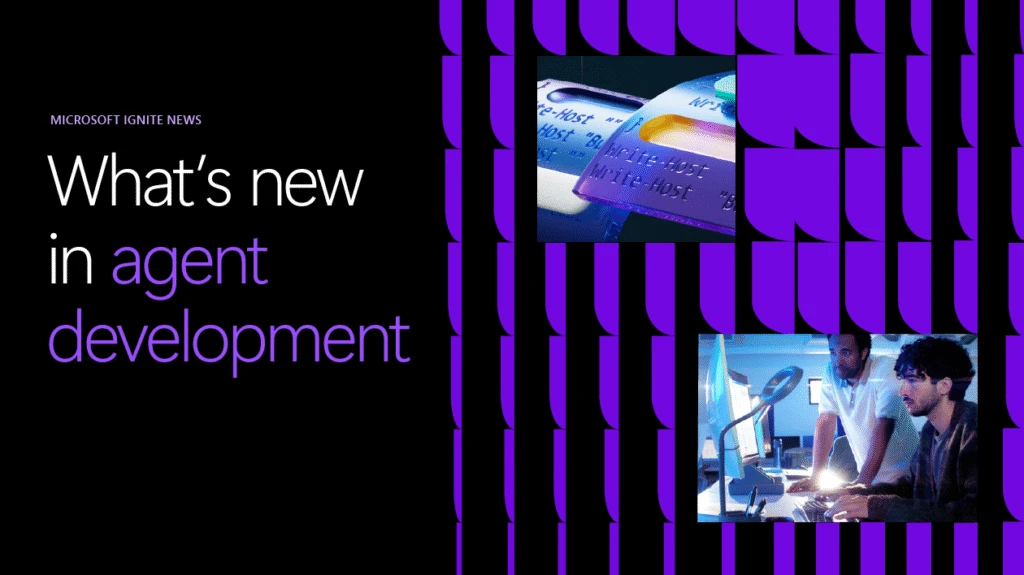One year ago, at Microsoft Ignite, we set out to redefine enterprise intelligence with Foundry. Our conviction was clear: software would evolve beyond rigid workflows, becoming systems that reason, adapt, and act with purpose. We envisioned developers moving from prescriptive logic to shaping intelligent behavior.
Today, that transformation is accelerating across industries and organizations of every size. The shift is tangible: agents are no longer just assistants, they are dynamic collaborators, seamlessly integrated into the tools we use every day. For builders, agents are reshaping software, and we are delivering a platform that empowers every developer and every business to embrace this moment with confidence and control.
Microsoft Foundry helps builders everywhere turn vision into reality with a modular, interoperable, and secure agent stack. From code to cloud, today demonstrates our focus on empowering developers with a powerful, simple—and trusted—path to production AI apps and agents. Here is the TL;DR:
- Foundry Models added new models from Anthropic, Cohere, NVIDIA, and more. Model router is now generally available in Microsoft Foundry and in public preview in Foundry Agent Service.
- Foundry IQ, now in public preview, reimagines retrieval-augmented generation (RAG) as a dynamic reasoning process, simplifying orchestration and improving response quality.
- Foundry Agent Service now offers Hosted Agents, multi-agent workflows, built-in memory, and the ability to deploy agents directly to Microsoft 365 and Agent 365 in public preview.
- Foundry Tools, empowers developers to create agents with secure, real-time access to business systems, business logic, and multimodal capabilities.
- Foundry Control Plane, now in public preview, centralizes identity, policy, observability, and security signals and capabilities for AI developers in one portal. GitHub Advanced Security and Microsoft Defender integration, now in public preview, helps improve collaboration between security and development teams across the full app lifecycle.
- Foundry Local, now in private preview on Android, the world’s most widely used mobile platform.
- Managed Instance on Azure App Service, now in public preview, helps organizations move their web applications to the cloud with just a few configuration changes.
Next-level productivity: AI-powered tools for builders
It all starts with developers, and GitHub is the world’s largest developer community, now serving over 180 million developers. AI-powered tools and agents in GitHub are helping developers move faster, build increasingly innovative apps, and modernize legacy systems more efficiently. More than 500 million pull requests were merged using AI coding agents this year, and with AgentHQ, coding agents like Codex, Claude Code, and Jules will be available soon directly in GitHub and Visual Studio Code so developers can go from idea to implementation faster. GitHub Copilot, the world’s the most popular AI pair programmer, now serves over 26 million users, helping organizations like Pantone, Ahold Delhaize USA, and Commerzbank streamline processes and save time.
Over the last year, developers have moved from experimentation to production. They need tools that let them design, test, monitor, and improve intelligent systems with the same confidence they have in traditional software. That’s why we built a new generation of AI-powered tools: GitHub Agent HQ for unified agent management, Custom Agents to encode domain expertise, and “bring your own models” to empower teams to adapt and innovate. With Copilot Metrics, teams evolve with data, not guesswork.
We’re committed to giving every developer the tools to design, test, and improve intelligent systems, so they can turn ideas into impact, faster than ever. Managed Instance on Azure App Service, now in public preview, lets organizations move existing .NET applications to the cloud with only a few configuration changes.
Enter Microsoft Foundry: The AI app and agent factory
Enterprises need a consistent foundation to build intelligence at scale. With Microsoft Foundry, we’re unifying models, tools, and knowledge into one open system, empowering organizations to run high-performing agent fleets and intelligent workflows across their business.
Today, teams can choose from over 11,000 frontier models in Foundry, including optimized solutions for scale and specialized models for scientific and industrial breakthroughs. I’m proud to announce Rosetta Fold 3, a next-generation biomolecular structure prediction model developed with the Institute for Protein Design and Microsoft’s AI for Good Lab. Models like these enable researchers and enterprises to tackle the world’s hardest problems with state-of-the-art technology.
Here is our top Ignite news for Foundry:
1. Use the right model for every task with Foundry Models
Innovation thrives on adaptability and choice. With more than 11,000 models, Microsoft Foundry offers the broadest model selection on any cloud. Foundry Models empowers developers to benchmark, compare, and dynamically route models to optimize performance for every task.
Today’s announcements include:
- Starting today, Anthropic’s Claude Sonnet 4.5, Opus 4.1, and Haiku 4.5 models are available in Foundry, advancing our mission to give customers choice across the industry’s leading frontier models, and making Azure the only cloud offering both OpenAI and Anthropic models. Also this week, Cohere’s leading models join Foundry’s first-party model lineup, providing ultimate model choice and flexibility.
- Model router (generally available) enables AI apps and agents to dynamically select the best-fit model for each prompt—balancing cost, performance, and quality. Plus, in model router in Foundry Agent Service (public preview), enables developers to build more adaptable and efficient agents; particularly helpful for multi-agent systems. model router in Foundry Agent Service (public preview), enables developers to build more adaptable and efficient agents; particularly helpful for multi-agent systems.
- A new Developer Tier (public preview) makes model fine-tuning more accessible by leveraging idle GPU capacity.
2. Empower agents with knowledge using Foundry IQ
The more context an agent has, the more grounded, productive, and reliable it’s likely to be. Foundry IQ, now available in public preview, reimagines retrieval-augmented generation (RAG) as a dynamic reasoning process rather than a one-time lookup. Powered by Azure AI Search, it centralizes RAG workflows into a single grounding API, simplifying orchestration and improving response quality while respecting user permissions and data classifications.
Key features include:
- Simplified cross-source grounding with no upfront indexing.
- Multi-source selection, iterative retrieval, and reflection to dynamically improve the quality of agent interactions.
- Foundry Agent Service integration to enrich agent context in a single, observable runtime.
Foundry already powers more than 3 billion search queries per day. By combining Foundry IQ with Microsoft Fabric IQ and Work IQ from Microsoft 365 Copilot, Microsoft provides an unparalleled context layer for agents, helping them connect users with the right information at the right time to make informed decisions.
3. Build context-aware, action-oriented agents with Foundry Agent Service
To be force multipliers, agents need access to the same tools and knowledge as the people they support. Foundry Agent Service empowers developers to create sophisticated single and multi-agent systems, connecting models, knowledge, and tools into a single, observable runtime.
Today’s announcements include:
- Hosted Agents (public preview) enable developers to run agents built with Microsoft frameworks or third-party frameworks in a fully managed environment, so they can focus on agent logic rather than operational overhead.
- Multi-agent workflows (public preview) coordinate specialized agents to execute multi-step business processes using either a visual designer or a code-first API. Workflows enable long-running, stateful collaboration with recovery and debugging built-in.
- Memory (public preview) enables agents to securely retain context across sessions, reducing external data-store complexity and enabling more personalized interactions out-of-the-box.
- Microsoft 365 and Agent 365 integration (public preview) enables developers to instantly deploy agents from Foundry to Microsoft productivity apps, making it easier to reach users directly within the M365 ecosystem while leveraging Agent 365 for secure orchestration, governance, and enterprise-grade deployment.

4. Enable agents to take action using Foundry Tools
The right tools can transform agents from simple responders into intelligent problem-solvers. With Foundry Tools, now in public preview, developers can provide agents with secure, real-time access to business systems, business logic, and multimodal capabilities to deliver business value.
Now, developers can:
- Find, connect, and manage public or private MCP tools for agents from a single, secure interface.
- Enable agents to act on real-time business data and events using more than 1,400 connectors with business systems such as SAP, Salesforce, and UiPath.
- Enrich workflows with out-of-the-box tools such as transcription, translation, and document processing.
- Expose any API or function as an MCP tool via API Management, reusing existing business logic to accelerate time-to-value.

5. Advancing security and trust with Foundry Control Plane
Scaling intelligence requires trust. As organizations rely on agents and AI powered systems for more of their workflows, teams need clearer visibility, stronger guardrails, and faster ways to identify and address risk. This year we’re expanding security and governance with two key announcements: Foundry Control Plane, now in public preview in Microsoft Foundry, and a new integration between Microsoft Defender for Cloud and GitHub Advanced Security, also in public preview. Together they give developers and security teams a more connected way to monitor behavior, guide access, and keep AI systems safe across the full lifecycle.
Foundry Control Plane brings identity, controls, observability, and security together in one place so teams can build, operate, and govern agents with confidence. Key capabilities include:
- Controls that apply unified guardrails across inputs, outputs, and tool interactions to keep agents focused, accurate, and within defined boundaries.
- Observability with built in evaluations, OTel based tracing, continuous red teaming, and dashboards that surface insights on quality, performance, safety, and cost.
- Security anchored in Entra Agent ID, Defender, and Purview to provide durable identity, policy driven access, integrated data protection, and real-time risk detection across the agent lifecycle.
- Fleet wide operations that unify health, cost, performance, risk, and policy coverage for every agent, no matter where it was built or runs, with alerts that surface issues the moment they appear empowering developers to take action.
Defender for Cloud + GitHub Advanced Security integration
Developers and security teams often work in separate tools and lack shared signals to prioritize risks. The new Defender for Cloud and GitHub Advanced Security integration closes this gap. Developers receive AI suggested fixes directly inside GitHub, while security teams track progress in Defender for Cloud in real time. This gives both sides a faster, more connected way to identify issues, remediate them, and keep AI systems secure throughout the app lifecycle.
6. Foundry Local Comes to Android: Powering Cloud to Edge
Six months ago, we launched Foundry Local on Windows and Mac. In that short time, it’s reached 560 million devices, making it one of the fastest-growing runtimes in enterprise history. Leading organizations like NimbleEdge, Morgan Stanley, Dell, and Pieces are already using Local to bring intelligence directly into the environments where work happens, from financial services to healthcare and edge computing.
Today, we’re taking the next step. Foundry Local is now in private preview on Android, the world’s most widely used mobile platform. This means agents can run natively on billions of phones, unlocking real-time inference, privacy-aware computation, and resilience, even where connectivity is unpredictable.
We’re also announcing a new partnership with PhonePe, one of India’s fastest-growing platforms. Together, we’ll bring agentic experiences into everyday consumer applications, showing how Local can transform not just enterprise workflows, but daily life at massive scale.
7. Modernize your web apps for the era of AI in weeks, not months
We see customers building net new AI applications and integrating AI into existing applications. Both require a modern foundation. Managed Instance on Azure App Service, available in public preview, lets organizations move their .NET web applications to the cloud with just a few configuration changes, saving the time and effort of rewriting code. The result is faster migrations with lower overhead, and access to cloud-native scalability, built-in security and AI capabilities in Microsoft Foundry.
Learn more and get started with Foundry
We hope you join us at Microsoft Ignite 2025, in-person or virtually, to see these new capabilities in action and learn how they can support your biggest ambitions for your business.
- Explore Microsoft Foundry.
- Watch our Innovation Session: Your AI Apps and Agent Factory.
- Watch all recorded sessions at Ignite.
- Chat with us on Discord.
- Provide feedback on GitHub.

